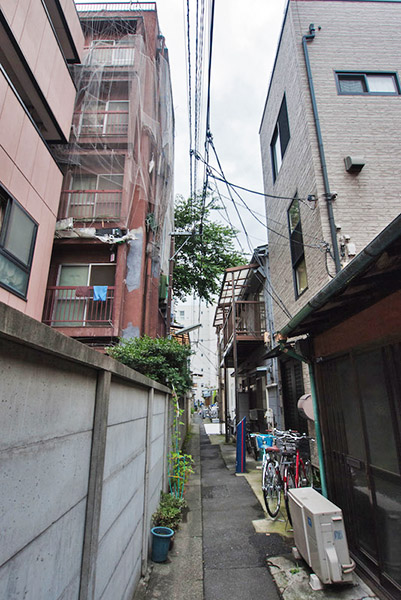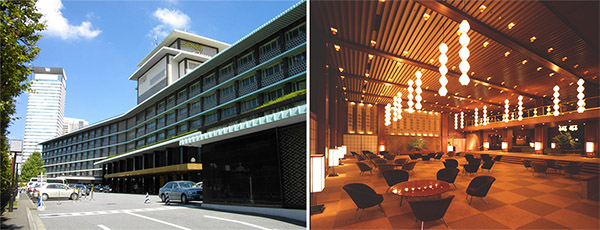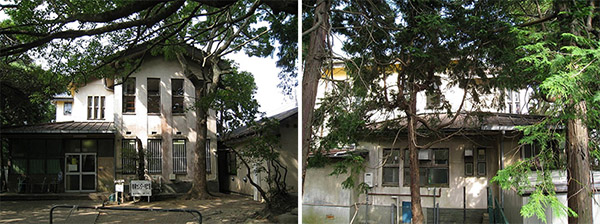53-yr old office conversion in Chiyoda-ku

Real estate developer Hulic Co., Ltd. has converted a 53 year old office building in Chiyoda-ku into a trendy shared apartment, office and event space. The building has been named ‘the c’ to represent the keywords behind the project, which were central, conversion, communication, culture and create.
Floors 3 to 9 have been converted into shared residential space, with a shared office space located on the 2nd floor. The top floor of the building has been turned into a shared lounge, theatre room and dining space for both residents and office workers. An event space was created in the building’s basement which can be rented out for events and meetings. The rooftop has an open terrace with wi-fi access.Read more
Scandal-ridden site in Shinjuku up for public auction

Due to the messy history behind this land, most people had given up on the thought of ever seeing this site redeveloped. However, the land is being put up for public auction on February 17, 2015, by the Tokyo Tax Office with a minimum bid set at 2.19 billion Yen (18.5 million USD).
The Shinjuku Building Incident
The site was once home to the Shinjuku Building - a 12-storey multi-tenant building built in 1983 and demolished in early 2011.Read more
Tokyo's plan to fireproof older neighbourhoods

Tokyo is pressing ahead with a 10-year plan to fireproof the older, densely packed neighbourhoods that dot the city.
January 17th marked the 20th anniversary of the Great Hanshin Earthquake. Many of the casualties were caused by fires spreading throughout tightly packed neighbourhoods of wooden homes. A fire that broke out after the quake in Kobe’s Nagata-ku burned for three days and destroyed 4,759 homes.
Suginami-ku
Just south of Asagaya Station in Suginami-ku is a neighbourhood of wooden homes built immediately after WWII. Many are located alongside small pathways and narrow roads not accessible by vehicles. Firetrucks cannot access many of the homes, which means fire can spread easily, placing residents at risk.
Under the Building Standards Act, when building a new home or altering an existing home alongside a narrow road, the land must be set back by 2 meters from the centre line of the road. Ideally all houses along the street would eventually do the same and the road would become 4 meters wide - enough to allow cars to pass through. However, many residents put flowerpots or park their cars on this setback portion of the road, rendering it useless.
In 2015, the local council plan to introduce regulations that would allow for the compulsory widening and levelling of roads. The land would not be purchased by the council, and landowners would not receive any compensation.Read more
Toranomon Hills 2-Bedroom Apartment For Sale

| SOLD |
It doesn’t get any better than this. We are excited to announce that a 2-Bedroom apartment in Toranomon Hills Residence, one of Tokyo’s most desirable and luxurious apartment buildings, has just become available for sale.
Toranomon Hills is a 247m tall, 52-storey tower containing office space on floors 6 ~ 35, condominium and rental apartments on floors 37 ~ 46 and the 5-star Andaz Hotel on floors 47 ~ 52. It is the second tallest mixed-use building in Tokyo, coming in at just 1 meter shorter than Tokyo Midtown.
Of the 172 apartments on the residential floors, only 70 were made available for sale with the remainder being kept by Mori as rental apartments. The 70 apartments were never publicly advertised for sale, and were instead offered by invitation to selected existing clients of Mori Building. All new apartments had sold out by the building’s completion in May 2014.
This 2-Bedroom apartment on the 45th floor is, to our knowledge, the very first apartment offered for re-sale in the building. It includes a wide balcony with wood decking, an open-plan kitchen, floor-heating in the living/dining room, and a master bedroom with walk-in closet. The apartment has not been lived in but is being sold fully-furnished and ready to move into. The interior finish has been upgraded by Kagami Reform. Furnishings include Armani and Cassina furniture, light fixtures and appliances. The apartment is north-east facing and has views towards the Toranomon, Roppongi and Akasaka areas, and Mt. Fuji on a clear day.Read more
Bottega Veneta joins fight to save Hotel Okura

Fashion and architecture go hand in hand, and pieces designed by some of the great designers can remain timeless for generations. Tomas Maier, the creative director of Italian fashion house Bottega Veneta, is hoping to spread awareness of some of Japan’s modernist architecture that is at risk of being demolished and lost forever. Of particular interest in Maier's campaign is the Hotel Okura Tokyo, designed by Yoshio Taniguchi and completed in 1962, which is scheduled to close and be demolished later this year.Read more
Secondhand apartment prices in December 2014 - Tokyo Kantei
For the first time in three years, the average asking price of a secondhand apartment in greater Tokyo has increased from the previous year. According to Tokyo Kantei, the average asking price of a 70 sqm (753 sqft) second-hand apartment in greater Tokyo in 2014 was 28,510,000 Yen, up 2.1% from 2013. In Tokyo’s 23-ku, the average price in 2014 was 42,030,000 Yen, up 5.2% from 2013. It is now 6.3% below the peak seen during the last mini-bubble in 2008.
Prices in December
The average asking price in Tokyo’s 23 wards was 43,790,000 Yen in December, up 1.1% from the previous month and up 7.7% from December 2013. The average building age was 22.2 years.
In central Tokyo’s six wards (Chiyoda, Chuo, Minato, Shinjuku, Bunkyo and Shibuya), the average apartment asking price was 61,970,000 Yen, up 1.1% from the previous month and up 12.8% from the previous year. The average building age was 21.4 years.
The average price across greater Tokyo was 29,870,000 Yen in December, up 0.5% from the previous month and up 2.3% from the previous year.Read more
Historic former library in Kamakura to be demolished

On January 5, Kamakura City announced plans to demolish a historic property that was originally the Kamakura City Library, and until recently had been used as a training center.
The 2-storey wooden building was completed in 1936. It is located between the Onarimachi’s local city office and the Onari Elementary School and is 200 meters west of Kamakura Station. Aside from a brief period during the war when it was confiscated by the military, the building had been was used a library until 1974. Afterwards it had been used by the city’s Board of Education for a variety of uses.Read more
